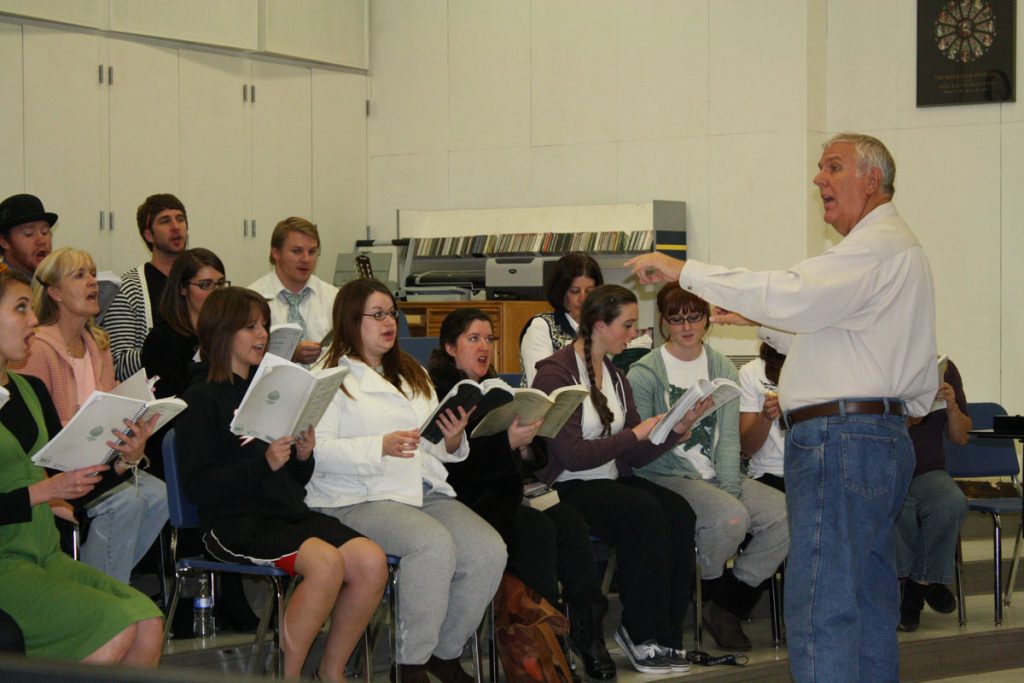The Messiah: a “goodie” inspired by G.F. Handel
“Lend me your ears” so-called music lovers, you are in for a treat this Christmas season. Obviously, we’re not talking about Reese’s Peanut Butter cups, chocolate oranges, or my personal favorite, See’s Candies. Although there is no sugar in the “ear-candy” I speak of, there is nothing sweeter than the work of a musical genius.

This archived article was written by: Nathan Manley
“Lend me your ears” so-called music lovers, you are in for a treat this Christmas season. Obviously, we’re not talking about Reese’s Peanut Butter cups, chocolate oranges, or my personal favorite, See’s Candies. Although there is no sugar in the “ear-candy” I speak of, there is nothing sweeter than the work of a musical genius.
The “goodie” I speak of is the inspired work of G.F. Handel, and his greatest oratorio “The Messiah.” This year marks the 64th production in Price. Before CEU choirs started taking on the daunting task of tackling this masterpiece, it started at Carbon High School.
Conducted by Dorothy Brown, whose name we may or may not recognize on the front of the music building on USU-Eastern’s campus. After teaching at Brigham Young University (specializing in stringed instruments), and inspiring students at CHS, they honored her and her husband, Dean, by dedicating the music building to them.
The only student of Dorothy’s that I have met thus far was one of her ninth-grade French horn players. This student was USU Eastern’s vocal instructor, Russell Wilson. Being too young to sing in the choir, he had no other choice, but to accompany with the orchestra. Playing the French horn is no easy task, but this is especially the case for the horn parts written in “The Messiah.”
Wilson had the musical insight to pick up on Handel’s genius, and was hooked ever since. You might say that this first introduction to “The Messiah,” instilled in Wilson, the drive and passion for music and Handel’s most celebrated work.
At the time Handel wrote “The Messiah,” one would never have guessed it would be his crowning achievement. Being revered early on as a dramatic genius, after writing the twelve “Chandos Anthems” and “Acis and Galatea,” he achieved fame, riches and much success.
But this early onset of success acted as a dual-edged sword, leading him down a trench like rut of repetitious unoriginal music; harsh words for arguably the greatest composer of all time. But at this stage of Handel’s professional career, and in his personal life, he had slumped into a deep depression, writes Max Spicker in the G. Schirmer’s Edition of Oratorios and Cantatas, “The Messiah.”
In 1741, a young composer from Dublin backed out from composing an oratorio based on the life and death of Jesus Christ, otherwise known as the Messiah. They wanted Handel all along, and this wasn’t the first time he was asked to write such a work. He had previously turned down the offer four times. After writing flop after flop and losing most of his riches (millions by today’s standards), he agreed to compose in hopes of pulling himself out of his artistic depression, Spicker continues.
Twenty-three days later, it premiered in Dublin, Ireland. Wrap your heads around the fact that the greatest choral, orchestration, recititations, and piano (harpsichord) accompaniment were written and rehearsed in only twenty-three days. George-Fredericke Handel was truly an inspired master. It’s no wonder that he is held in such high esteem by the greats, both in his time and since, Spicker writes.
In conclusion, Spicker acknowledges, “Ludwig van Beethoven, being so hard a man to please,” said it best of Handel, “He was the master of us all, the greatest composer who ever lived. I would uncover my head, and kneel at his tomb. I go to him to learn how to achieve great effects, by such simple means. He is the king of us all.”
If there is any man who understands Handel, it’s Wilson. Other than performing in “The Messiah” for many years, this is his 42nd production as either a participant or conductor. He understands the message Handel was trying to portray of hope, peace and mercy. He knows how to bring out the emotions of Handel through the dynamics of the score, when to hold back and when to strike like thunder. He knows G.F. Handel.
Wilson has put together an incredible program. The advantage Wilson has is his experience and the thousands of students he taught, he can pick the cream-of-the-crop. This is exactly what he’s done for the soloists on the program this year. He is bringing back four of his best students for the Sunday night showing, Dec. 4. Russell Seeley will sing bass, Jennifer Taylor, alto; Ben Jones, tenor; and Jennifer Roundy, soprano. This is the first time Wilson is bringing in CEU graduates for the production.
What I love most about Russell is he never stops moving forward and seeking new talent. Along with his past soloists who will perform on Dec. 4, he is encouraging his USU Eastern students to audition for the solos in the Monday night concert, Dec. 5.
“We have the best orchestra this year that we’ve ever had,” Wilson added. We have some of the best musicians locally accompanying who have performed in the past, alongside some new talent. Jan Curtis-Tollestrup and Bob Davidson on the viola are among the additions in the orchestra. We have a mother-daughter team: daughter Shari Jensen on violin and mother Elise Tuttle on harpsichord. Tuttle is the piano instructor at USU-Eastern.
Students, friends, and music lovers alike; come share the experience and joy of true musical genius: one-part composer, the other conductor. Mark your calendars for the two night production at the Price Civic Auditorium, 7:30 p.m. on Sunday, Dec. 4, and Monday, Dec. 5 of Handel’s “The Messiah.”




